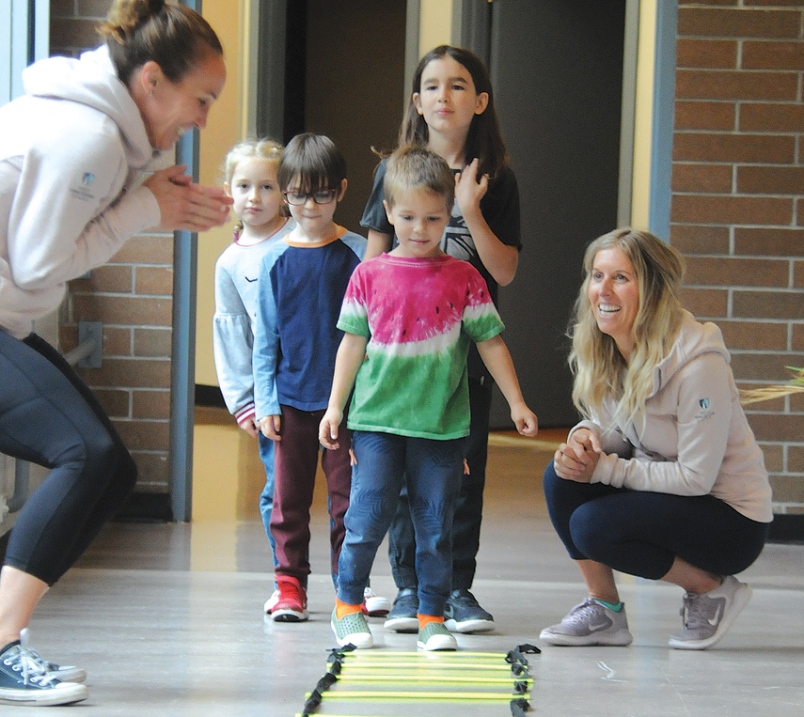West Vancouver makes physical literacy headlines

Photo by Mike Wakefield, North Shore News
An ambitious multi-year physical literacy initiative in West Vancouver is making headlines across the country as the school district moves toward integrating movement into their everyday curriculum.
After launching the project during the 2015/16 school year, initially working with only one grade, they’ve now expanded their efforts to include every student from K to 12.
“The goal has always been to try to create a district-wide culture that values movement, by promoting and encouraging people to get active by hosting workshops, providing resources and identifying champions at each school. Somehow our efforts were never sustainable and we couldn’t figure out why. The message was important and understood, but it seemed to always be on the back burner,” said Diane Nelson, Director of Instruction, Learning and Innovation at West Van Schools.
“Literacy, numeracy and everything else seemed to be valued, but movement always came last. It wasn’t until we had a moment where we thought ‘let’s embed this right into the classroom’ that we started to gather momentum.”
Previously physical literacy champions distributed detailed lesson plans. It wasn’t until they transitioned to a digital video format, so students could visually see what they were supposed to do, that they started to see widespread buy-in. The team decided to make participation mandatory, with a focus on being mindful about movement anytime and anywhere — not just when it’s scheduled. As they assessed the kids, they found that many couldn’t complete skills they assumed they would be able to.
“We knew that teachers had so much on their plates, so we decided that distributing detailed lesson plans was not going to work. Instead we had the idea of putting together resources that were delivered right into the teachers’ email boxes in a digital format that could be easily viewed,” said Nelson.
As teachers grasped the ideas quickly and were able to deliver the activities to their students with success, their competencies along with their overall confidence went up as educators, according to Nelson.
“We cracked the code with those assessments, which were key because it showed us clearly that these kids were not competent at very basic skills,” said Amber Pascual, one of the physical literacy mentors along with Erin Crawford. They learned that of the 1,580 students they assessed only 13 could competently perform the five skills.
They decided to take the “no excuses approach”, where they contacted teachers and told them they couldn’t afford to miss this opportunity. During their first year they worked exclusively with Grade 2s, and once they began looking at the numbers they were shocked at the results.
“Not only could they not do the movements, they actually didn’t even know what the movements were because they hadn’t learned the vocabulary. For instance, a hop and a jump are very different things,” said Crawford.
“Once we gave them the vocabulary, they quickly caught up with their ability to do the movements. Kids we saw in that first year now have that vocabulary and language to begin with. They’ve gone from timid to ‘check me out, I’ve got this nailed’. They absolutely want to show off their skills.”
This year, in late August, they hosted a full-day event with all the administrators dedicated to physical literacy and mental health, aiming to get everyone on the same page. Superintendent Chris Kennedy dedicated the entire day to physical literacy and mental health. They had the administrators try the movements so they could have a better idea of the activities being offered and how they can be embedded into the classroom.
Following that one-day conference, Superintendent Chris Kennedy also held a West Vancouver Schools’ district-wide event for all employees prior to school opening in September. The event featured talks from the medical officer of health, Dr. Mark Lysyshyn, as well as Dr. John Cairney and Dr. Dean Kriellaars, who are global leaders in developing physical literacy. They all spoke about the urgency of the movement and its long-term implications.
“It was one of the best opening days ever, as the urgent message seemed to resonate with everybody because they received a standing ovation. From there it’s been nothing but emails and requests for more information as everyone gets excited about where this is going next,” Nelson said.
Sport for Life’s Drew Mitchell, who has supported Nelson in introducing physical literacy to the West Vancouver School District, was thrilled to see the enthusiastic uptake from administrators as well as the resulting headlines. He believes the accomplishments of West Vancouver can stand as an example to other institutions, governments and school districts as Canadians continue to embrace physical literacy in impressive numbers.
“What is happening in West Vancouver is purposeful and incremental, and it’s only after years of work that we’ve been able to reach this particular zenith. Our vision is for the student developing physical literacy to carry it over into the rest of their lives, sharing their passion for movement with their peers and their families,” he said.
“The social benefits for these kids, as well as the long-lasting physical and mental health benefits, will give them the tools they need to be confident and active for their entire life.”
